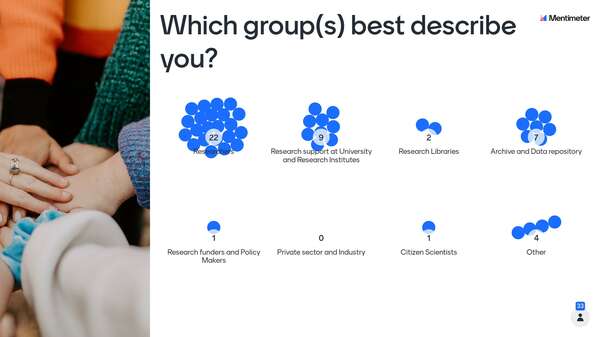
How to train data managers and researchers about Open Science
The train-the-trainer workshop offered teaching recommendations to trainers from data archives and academic research support departments.
A train-the-trainer online workshop called “How to Ensure Researchers Share Their FAIR Data: Practical Tips and Tools” took place on 27 October 2022. The workshop was jointly organised by the UK Data Service, the Austrian Social Science Data Archive (AUSSDA) and the Czech Social Science Data Archive (CSDA). About eighty data managers and researchers from mostly European countries attended the event.
Speakers and panellists addressed the following key issues connected to open science and data sharing in the social sciences:
-
ethical and legal aspects of data sharing,
-
anonymisation and licencing of research data, and
-
high-quality data management.
The three main objectives of the workshop were to:
-
raise awareness of key tools and resources available for Open Science training,
-
enable a platform to exchange ideas regarding key training topics, and
-
provide training materials and worksheets for future use.
A DMP helps researchers not to get lost in their research project
Cristina Magder from the UK Data Service presented CESSDA tools and services:
-
the CESSDA Data Catalogue – with metadata records of over 30,000 social science research studies from European Service Providers,
-
the European Language Social Science Thesaurus (ELSST) – with core social science indexing concepts ensuring interoperability across European Archives, and
-
CESSDA Training resources for trainers and researchers such as the CESSDA Data Management Expert Guide (DMEG) and the Data Archiving Guide (DAG).
Johana Chylíková from CSDA showed how to explain the concepts of Open Science and data management to researchers. She also pointed out possible difficulties that trainers may encounter when explaining the purpose of data sharing to researchers.
She proposed several arguments for convincing researchers that data sharing and open access to data are beneficial to both the research community and to individuals.
Data reuse and sharing
-
allows everyone who is interested to have access to scientific results,
-
is economical, as the financial resources are effectively used, and
-
helps the social sciences to develop dynamically, as exchanges in the researcher community drive progress.
Data trainers were encouraged to explain to researchers that a Data Management Plan (DMP) is not only a formal requirement from funders but also a practical tool. A DMP helps researchers not to get lost in their research project.
Sharing data while protecting individuals
Dr Dimitri Prandner from AUSSDA presented the ethics of consent concerning empirical research and data archiving. He pointed out the possible clash between the goals of Open Science, i.e. the need to share data with the research community, and the necessity to protect the individuals that take part in the research project.
In his view, the principal duty of researchers is to enssure that information about the respondents is not misused or misinterpreted. Consent forms are therefore necessary. These should contain all the information that respondents need to decide whether or not to take part in the research project.
Guest speaker Walter Scholger, from the Austrian Centre for Digital Humanities at the University of Graz demonstrated how to use the DARIAH ELDAH Consent Form Wizard. This semi-automated tool creates GDPR compliant consent forms.
How should you anonymise your data?
Cristina Magder shared her recommendations on how to train trainers on data anonymisation. She focused on what trainers should not omit in their training classes.
Trainers should:
-
use practical examples as much as possible,
-
present different types and strategies of anonymisation of quantitative and qualitative data,
-
make use of anonymisation tools for quantitative data – such as QAMyData, Amnesia Anonymization Tool, or sdcMicro – and
-
show how to use them and explain their pros and cons.
Cristina Magder stressed the importance of licensing data and presented what types of licences are used in data archives and repositories.
Licencing frameworks and issues for data archives
Speakers presented the licencing frameworks of several CESSDA archives in Austria, Croatia, Germany, and the UK.
Dimitri Prandner (AUSSDA), Marijana Glavica (CROSSDA), Oliver Watteler (GESIS) and Cristina Magder (UK Data Service) reflected on their experiences using different licences in social science data archives.
The key takeaways were how all the different archives use similar licencing frameworks starting from Open Access to Restricted Access. By implementing these frameworks they play a critical role in supporting the research community by making data available while meeting ethical and legal requirements.
Some issues that archives are dealing with are:
-
difficulties in monitoring usage statistics under the Open Access licence,
-
challenges in harmonising licences for data access due to country specific legislation and considerations, and
-
an urgent need to start establishing secure data centres for remote access in more CESSDA archives.
Food for thought
Break-out rooms allowed participants to pick their topic of interest and discuss challenges and potential ideas for different training sessions with others.
There were three rooms to choose from:
-
Open Science
-
Ethical and Legal considerations
-
Anonymisation and Licence Frameworks.
Researchers, as data producers, can benefit from clear, well-structured and in-depth training sessions about Open Science, though they can also be relevant for data repository support staff and archive staff, as data stewards. Training sessions about Open Science can ensure FAIR (Findable Accessible Interoperable Reusable) data is more consistently shared.
Trainers therefore need the tools to teach these groups about the key aspects of Open Science such as data management planning, ethical and legal considerations, and licencing.
Why not consider organising bootcamps, or 2–3 day training events, on topics related to training researchers and data managers about Open Science?
More information: